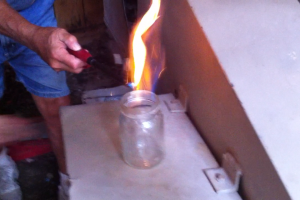Industry Issues Guidance on Methane Migration

Scott Detrow / StateImpact Pennsylvania
A Leroy Township, Bradford County resident lights a sample of methane gas on fire. The gas has been bubbling into puddles and creeks for more than two months.
By now, videos of residents lighting their taps on fire are a familiar image. Those flames are caused by methane that migrated into a subsurface water supply and is known as methane migration, or “stray gas.” Perhaps the most famous incident of stray gas happened in Dimock, Susquehanna County. The Pennsylvania Department of Environmental Protection blamed Cabot Oil and Gas. Cabot says its drilling operations did not create the stray gas problem in Dimock. Rather, the company says the problem existed long before it arrived to start drilling.
Either way, the Marcellus Shale Coalition, an industry group, has issued guidance to its members about how to handle reports of stray gas ending up in residential water wells or surface water near oil and gas drilling sites. The stray gas can originate in coal beds, shallow pockets of methane, and deeper sources of methane such as the Marcellus Shale. Oil and gas drilling operations can cause the gas to migrate into drinking supplies and surface water, but it’s not the only cause.
The MSC says transparency and open lines of communication with residents, regulators and emergency responders are a priority when faced with a stray gas complaint. The health impacts of drinking water containing methane are not known. But the release of high concentrations of methane in a house or other enclosed building can be dangerous and cause an explosion. The MSC says the first response may be evacuation.
“For the most critical situations where immediate hazards may exist from the presence of stray gas, immediate action should be taken to protect public safety and property. These measures may include evacuation and/or ventilation procedures. Because operators do not have the authority to initiate an evacuation, notification and cooperation with local emergency response organizations is critical.”
If the water supply to a house needs to be turned off, the MSC says the drilling operator should consider providing water to the residents. For more about industry guidelines for responding to stray gas, click here.
















